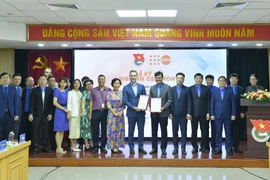 Vietnam has been putting gender equality, women’s empowerment, and human rights at the centre of development. (Photo: VNA)
Vietnam has been putting gender equality, women’s empowerment, and human rights at the centre of development. (Photo: VNA)In his article, titled “Women and girls are empowered to make their owndecision” and penned on theoccasion of the 114th anniversary of InternationalWomen’s Day (March 8), Jackson said overrecent years, dedicated investments in the health and rights of women and girlshave improved – and saved – millions of lives but progress is slow. Globally, inthe last 20 years, maternal mortality rates have declined by 34%, yet awoman still dies every two minutes during pregnancy or childbirth, pointing to ahidden global crisis.
“Vietnam has made great strides surpassing theglobal trend to reduce maternal mortality by 46.5% over the same period,” he said,suggesting that the focus must now shift to areas where rates are still highsuch as among ethnic minorities in rural and mountainous regions.
Another success story is the number of women usingmodern contraception which, globally, has doubled to 77% over 30 years. Yetmore than 250 million women who want to avoid pregnancy are not using familyplanning.
In Vietnam, the use of modern contraceptives isaround 60% - also an increase. However, the unmet need is four times higher forunmarried women than it is for married women.
“This tells us we have much more to do in ensuringservices reach adolescents and young people,” the UNFPA representative noted.
Mentioning gender-basedviolence, he said the 2019 National Study on Violence Against Women in Vietnamfound that nearly two-thirds of women experience intimate partner violence andthat 90% of these women never seek help.
“Our response is threefold: to support services suchas the national GBV hotline and One-Stop-Service Centres; to tackle root causessuch as gender inequality to prevent violence; and to change the stigmaassociated with violence,” he said.
According to Jackson,on the occasion of International Women’s Day, the UNFPA in Vietnam is runningan online challenge and webinar to raise awareness and share experiences ofyoung people protecting themselves online, given the context of the risinglevels of online violence with women and girls particularly at risk ofimage-based abuse.
“It’s important to remember that we are not just onestory – there are many parts that make up our identities and our lives. Forthis reason, I am committing UNFPA in Vietnam to ensuring that our projects andprogrammes work for everyone who needs them,” he said.
“To achieve this, we must be people-centred andreflect their wishes and needs. Women’s leadership is critical to Vietnam’ssocial-economic growth.”
“The arguments for gender equality for individuals,communities and the economy are clear. Together we can create societies wherewomen and girls are empowered to make their own decisions. These actions willhelp to ensure that we leave no one behind,” he concluded./.





























